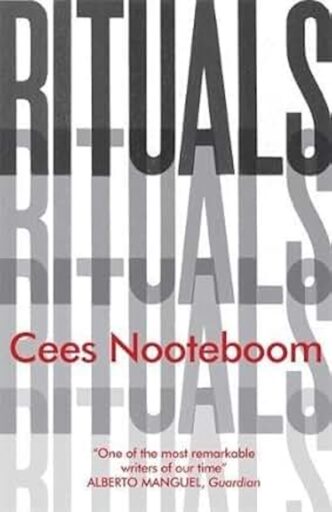William James said belief is what we actually attend to, as opposed to what we simply profess. On those terms, I must be the world’s most devout follower of Cees Nooteboom’s novel Rituals (1980), which I read again recently on a long flight home. I’m haunted by these languid, philosophical pages. I keep going back to try to understand the haunting.
Nooteboom’s novel offers snapshots of its protagonist, Inni Wintrop, at three distinct junctures of his life. Inni is a drifter, a “dabbler,” an indifferent horoscope-writer, a failed husband, a sometime-collector of artistic prints, and an acquaintance of two difficult loners: Arnold Taads and his estranged son Philip. Both father and son face life with granite cynicism. Their efforts to defy a meaningless world with relentless discipline form one of the echoes of the book’s wide-open title.
In previous passes, I have experienced this novel as a coming-of-age portrait, as a dialogue with and about religion, as a story of family and legacy, and as one more Nietzschean attempt to avoid pessimism when so many things point in that dark direction. But the book meditates through feeling rather than reflection. It philosophizes through sentiment and association. One of Nooteboom’s drifting meditations about Inni tries to frame this core paradox: “Thinking—what was that exactly, anyway? He read a lot, but what he read, and not just that but everything he saw, films and paintings, he translated into feeling. And this feeling, which could not immediately be expressed in words, not yet and maybe never, that formless mass of sentiments, impressions, observations—that was his way of thinking. You could circle around it with words, but there always remained far more that was not expressed than was.”
One of the ideas or dimensions that Inni circles with words and with feeling is the role of time. In my most recent reading, Time seemed, in fact, to become the book’s main character (worthy of a capital letter), or at least its central current, pulling the other meditations along. Read this way, Rituals presents our experience of Time, our imagining of Time, as a quiet form of moral education. Registering the strange experience of Time is, I think, what keeps Inni from succumbing to the cynicism of Arnold and Philip Taads. Feeling Time—since thinking and feeling for Inni are one—elevates and extends his experience of life and simultaneously limits it. Circling that paradox is what lets Inni, in the end, do what neither Taads can manage: modestly but surely, he affirms the world. Where father and son use ritual to silence the world, Inni is quickened, even if he is bewildered, by his alert associations. The affirmation of life in Rituals is as sober as affirmation comes. But it’s there. That may be why I’m so haunted by the book’s achievement.
What Nooteboom attunes us to are the incidental ways that a perception of Time expands us. Early in the book, for example, Inni imagines being parted from a lover, and then he keeps thinking forward to their deaths, “each one separately, in different hospital beds, ill treated by young nurses who were not yet born.” A section break follows, as if the story is pausing to let us register this strange perception: nurses not yet born would be in attendance when they were old and dying. Somehow someone important to his life was not yet even conceived, or thought of—except by him. That’s all. Nothing mystical. But strange and haunting.
Nooteboom presses this strangeness over and over. In one scene, Inni catches a reference to an ancestor marrying “a Catholic girl,” and it mobilizes his imagination: “So there had been, in other centuries, girls who had been relations of his. Invisible girls who, with girls’ mouths that he had never seen, had pronounced their surname, his.” In another scene, a priest is lifting a glass of fine port wine. “To think,” he says, “that Chamberlain had not even gone to Munich when the grapes of this wine were still hanging in the vineyard in the full heat of the sun.” In church, helping a priest, Inni observes that the Eucharist “had to do with the Minotaur.”
The crescendo of these associations occurs in the novel’s middle section. Inni judges himself to be a man whose life is a collection of incidents without any organizing idea or project. “He simply existed,” Nooteboom writes, “a son without a father and a father without a son, and things just happened.” And yet, in a pivotal passage, Inni considers that simply having an awareness of the immensity of Time and of the history that happens in it adds dimension, and maybe meaning, to his own life. He holds this strangeness, unsure what to do with it, and yet he is convinced that it matters deeply:
But how was it, then, that while he had the feeling that he had done nothing himself and that everything had only happened to him, his life seemed so long? He had already been here for thousands of years, and if he had studied zoology, it would have been millions. Small wonder, with such a past, that you could not remember everything, and yet at the same time it was surprising what you did remember. And stranger still was the equivalence of these recollections, in which the announcement of his father’s death was on a par with all kinds of other annexed events, such as Thalassa Thalassa, the Crucifixion, and the burning of the Reichstag. All of it was you, in effect, for although you had not experienced it all, it had woven itself into your life…. Strange chemical processes in your brain had seen to it that you were aware of the Paleozoic, which therefore, somehow or other, had become part of your experience, so that you yourself were connected with unimaginably distant times to which you would belong until you died, by virtue of that same mysterious mechanism.
In passages like this one, Nooteboom is doing something more than expanding our imaginative associations. His treatment of the awareness of Time, and our strange participation in it, has a moral effect, insisting on a longer, framing perspective. This is both ennobling and humbling. Late in the novel, Inni assesses his life at the age of forty and rattles off a list of things that are theoretically available to him to do but that, in fact, he will never do. Time stretches away in either direction, suggesting infinite possibility, yes, but at some point, Time measures our limits and our modesty too. “Perhaps all things had been possible, but they were no longer,” Inni decides. “You did not have a thousand lives. You had only one.”
In Inni’s perception of the world, events and experiences are trying to mean something but don’t quite convince him. Yet that feeling of meaning trying to break through is still a kind of affirmation. It is an affirmation of strangeness, of limitation, of a veil, of hints and glimpses, and, finally, of mystery. I’m haunted by Rituals because Inni is haunted and Nooteboom seems haunted by the motions of associations that pull our one life through the reaches of imaginable Time. Nooteboom’s framing of our condition, like Pascal’s, makes us both galaxy large and pixel small.
The grand thing we are part of refutes our small cynicism. The limits of our life and perception refute our overconfidence. Somewhere in between, we can live gratefully and humbly. We can affirm a feeling about the world we experience, even if we are inadequate to tell its full story. This is how a novel like Rituals enacts a kind of moral education. It lets us see ourselves in expansive contexts that then frame how we judge our narrowness. It doesn’t show us what we have to be. It modifies the frame for how we see. To feel an effect like this is to begin to avoid cynicism. It convinces us there is more to behold.
—Todd Shy is Head of School at Avenues The World School in New York City and the author of Teaching Life: Life Lessons for Aspiring (and Inspiring) Teachers. His essays and reviews have appeared in the Los Angeles Review of Books, Commonweal,Comment, The Point, San Francisco Chronicle, Christian Century, and other publications.





